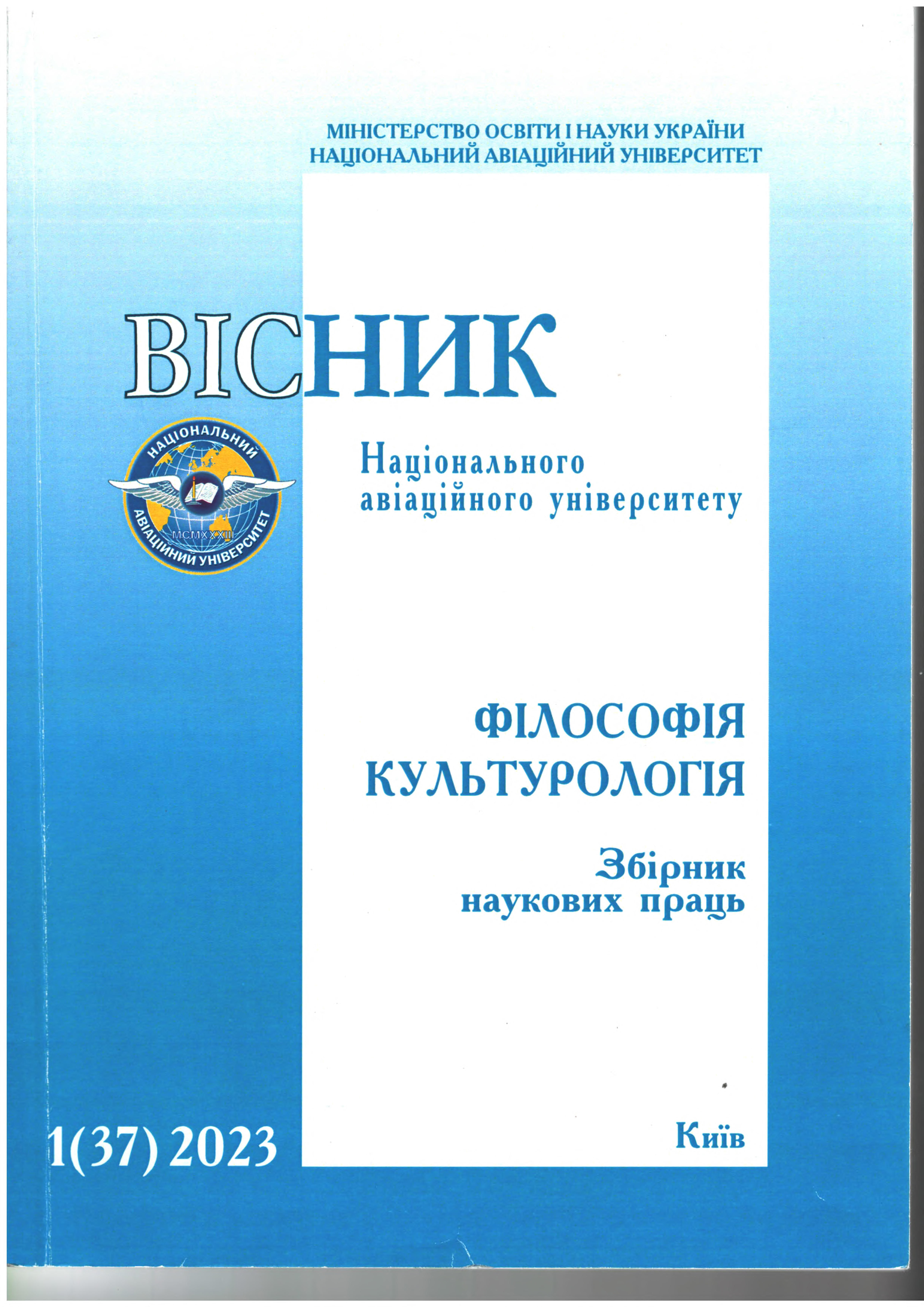CONTROLLED CHAOS AS A TOOL FOR RADICAL SOCIAL CONSTRUCTION OF CONTEMPORARY IN THE CONTEXT OF GLOBAL CHALLENGES
DOI:
https://doi.org/10.18372/2412-2157.37.17577Keywords:
теорія хаосу; синергетика; соціальне конструювання; соціальні проєкти; глобальні викликиAbstract
Introduction. The problem of interaction of regions, cultural centers, countries, societies at different stages of their development is
significantly updated in the globalized world. One of the manifestations of globalization is the uneven economic and sociocultural
development of different peoples, regions, civilizations, etc. which makes this problem worse. In the course of interaction in the
globalized world, societies use various technologies to influence each other's behavior as much as possible. The aim is the
implementation of a philosophical analysis of controlled chaos as a tool of radical social construction of the present in the context of
global challenges. Research methodology. The research used dialectical and synergistic methods in their integrative combination.
Research results. Since the moment of its appearance, "chaos theory" developed as a mathematical concept, but later it spread to
other fields of knowledge, including humanitarian ones. To a large extent, this is facilitated by the development of the interdisciplinary
science of synergetics. Some Western researchers studying complex dynamic non-linear social systems (especially political ones)
depart from the understanding of social processes from the position of recognizing the mutual influence of a certain number of factors
leading to the stabilization of relations, and focus on what contributes to the formation of chaos (S. Mann). Given that these systems
always contain factors that push them beyond stability, the scientists believe that it is necessary to increase the exploitation of this
criticality, using it as a tool to spread chaos to ensure US national interests. In this way, the developed economies of the world have the
opportunity to influence the transitional countries, determining their place in the global economic system. Discussion. The usage of the
social technology of "controlled chaos" in geopolitics leads to an artificial increase in entropy and the spread of destructiveness to the
social spheres of developing societies. This technology use causes divergent changes in the structure of social relations, which make
social development and structural restructuring impossible, thereby institutionalizing their transitivity as a liminal phase, which becomes
a certain type of stationary state of transitional societies. Conclusions. Such activity leads to deepening of social and natural problems
called "global challenges". This especially applies to the problems related to the preservation of peace and stability, because the use of
radical social technologies of significant influence to other societies dramatically increases conflictuality in the world.
References
Inglehart R, Welzel C. Modernization, Cultural Change, and
Democracy. The Human Development Sequence. Cambridge
University Press. 2012.
Sharp G. Making Europe unconquerable: the potential of
civilian-based deterrence and defence. London: Taylor & Francis.
252p.
Shvets, A. (2021). Overview of Scenarios of Transition to
Chaos in Nonideal Dynamic Systems. In: Skiadas, C.H.,
Dimotikalis, Y. (eds) 13th Chaotic Modeling and Simulation
International Conference. CHAOS 2020. Springer Proceedings in
Complexity. Springer, Cham.
Sorokin P. Social and Cultural Dynamics A Study of
Change in Major Systems of Art, Truth, Ethics, Law and Social
Relationships. New York, Routledge. 2017. 720 p.
Mann Steven R. Chaos Theory and Strategic Art. The US
Army War College Quarterly: Parameters The US Army War
College Quarterly. № 22 (1) 1992, 54-68 p.
Stiglitz J. Making globalization work. W. W. Norton &
Company. New York, London, 2006. 358 p.
Sztompka P. Trauma wielkiej zmiany. Warszawa: ISP PAN,
117 s.
Дротянко Л. Г. Екологічна криза техногенної цивілізації:
ризики ХХІ століття. Вісник національного авіаційного
університету. Серія: Філософія. Культурологія: Збірник
наукових праць. 2 (34), К.: НАУ, 2021. 9-14.
Карпова Г. М., Коротун С. І. Основні поняття і категорії
математичної теорії хаосу. Вісник Національного
університету водного господарства та природо-
користування. Серія «Економіка». № 3 (59), 2012. 99-107.
Клешня Г. М. Екологічний імператив як фактор антро-
пологічної безпеки сучасного суспільства. Вісник національ-
ного авіаційного університету. Серія: Філософія. Культуро-
логія: Збірник наукових праць.1 (31). К. : НАУ, 2020. 57-63.
Клешня Г. М. Особливості соціального проєктування в
культурі постмодерну. Вісник національного авіаційного
університету. Серія: Філософія. Культурологія: Збірник
наукових праць. 2 (20). К.: НАУ, 2014. 129-133.
Литовченко І. В., Королюк К. А. Особливості дисфункціо-
нальності інститутів соціалізації молоді в умовах розвитку
сучасного суспільства: соціально-філософський аналіз. Вісник
національного авіаційного університету. Серія: Філософія.
Культурологія: Збірник наукових праць. 2 (30). К.: НАУ, 2019.
С. 52-55.
Орденов С. С. Соціальна лімінальність як стаціонарний
стан транзитивних суспільств глобалізованого світу. Вісник
національного авіаційного університету. Серія: Філософія.
Культурологія: Збірник наукових праць. 1 (29), К. : НАУ, 2019.
С. 55-66.
Сухова Н. М. Доля прогресу в цифрову епоху. Вісник
національного авіаційного університету. Серія: Філософія.
Культурологія: Збірник наукових праць. 1 (35), К. : НАУ, 2022.
С. 115-119.
Ченбай Н. А. Проблема кризи духовності в контексті
нових цивілізаційних викликів. Вісник національного
авіаційного університету. Серія: Філософія. Культурологія:
Збірник наукових праць. 2 (36), К.: НАУ, 2022. С. 130-133.

